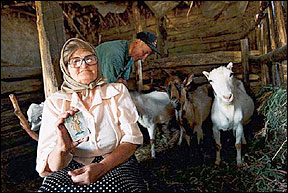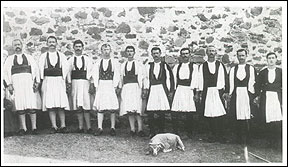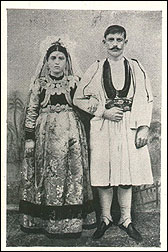A Roman Legacy in the
Balkans: The Vlachs
© Southeast European Times
May 9, 2005
Believed by many to represent the
descendants of the Roman population in the Balkans, Vlachs live in many
parts of the Balkans and Eastern Europe. Though Vlach communities
flourished in the past, the turbulent history of the Balkans has left
them scattered and isolated and their identity as a distinct ethnic
group has become increasingly tenuous.
By Marian Tutui for
Southeast European Times in Bucharest – 09/05/05

[File] |
This year marks the 100th anniversary of an
imperial decree, issued by Ottoman Sultan Abdual Hamid II, which gave
Vlachs their first collective rights. They were enabled to use their own
language in churches and schools, as well as to choose their own local
councilors. Thus they were able to found schools, churches and other
national establishments. Between 1908 and 1913 they also had a deputy, a
senator and a minister in the Ottoman Parliament. On 2 May, Vlachs all
over Southeast European celebrated their International Day.
Traditionally a shepherd people, their
search for better pastures has led them across the Balkans and Eastern
Europe, and Vlachs can be found as far north as Poland. Their dedication
to a pastoral way of life has often kept them away from the bitter
ethnic fighting which has ravaged the Balkans over the centuries, and
they co-exist peacefully with the majority populations wherever they
live. At the same time, however, they have struggled to maintain their
identity.
The origin of Vlachs, like that of the
linguistically related Romanians, remains an unresolved puzzle. Both
peoples are considered by some to represent descendants of Roman peoples
in the Balkans, while others argue that they descended from Romanised
colonists. Romanian culture was influenced by the Slavs, while Vlachs,
originating south of the Danube, show Byzantine and Greek influences.

Vlach dancers c. 1905. [Courtesy of Marian Tutui] |
Historians call them Macedo-Romanians, and
they themselves use the name Aromanians. The consensus among linguists
is that Vlach and Romanian are variants of the same Latin-based language
(another, Dalmatian, died out in 1898, while Istro-Romanian is spoken by
a few thousand people in Croatia). Toponyms, such as Mount Durmitor in
Montenegro, attest to the continued presence of Latin-speaking peoples
in the Danube and mountain regions.
The name "Vlach" comes from Gothic, and
originally meant "foreigner", and later "speaker of Latin idioms".
German tribes used the name "Welsh" for the Roman population of what
eventually became known as Wales, while the Romans of Southern Belgium
were given the name Walloons. Hungarians to this day refer to Italy as
"Olaszag," or "Land of Olachs" -- their version of the term. During the
Byzantine Empire, several Vlach territories were recorded, but they
seldom became powerful states. The Vlachs' greatest success occurred
during the Assan dynasty (1185-1258), when they established the second
Bulgarian Empire or the Bulgarian-Vlach state.
Towards the end of the 18th century, in
Albania the Vlach town of Moscopole (Voskopoje) boasted 22 churches, an
academy, a printing house, and a population of as many as 60,000. At
this time, the first Vlach dictionaries, grammar books and primers were
published. In 1788, however, Ali Pasha Tepelena destroyed the
flourishing town of the Vlachs.
By the middle of the 19th century, Vlach
communities had established schools and churches, and enjoyed the
support of the authorities. The subsequent collapse of the Ottoman
Empire led to the division of its territories into independent nations,
which varied in their treatments of the Vlach population. Between 1925
and 1932, an organised Vlach mass migration to Romania took place,
involving between 4,946 and 6,553 families. The communist regimes that
later took power across the Balkans shut down all Vlach schools and
establishments. Generally speaking, Vlachs were at a disadvantage during
the era of rising nationalism.

Vlachs c. 1903. [Courtesy of Marian Tutui] |
The newly-formed states often strove for
cultural homogeneity, while scattered communities of Vlach shepherds and
merchants were not cohesive enough as a group to maintain their
identity. Moreover, redrawn borders split and isolated existing
communities. Though once numerous in the Balkans, censuses show that
today they represent less than 1 per cent of the population.
Nevertheless, Vlachs did play a significant
role in some of the key events in the Balkans during the 20th century.
In 1903, during the Saint Elias Uprising in Macedonia at Krushevo (where
the 4,000 Vlachs represented two thirds of the population), a
multinational government was established. Three of its ministers were
Vlach, as was the local military leader, Pitu Guli (1845-1903), widely
revered as a Macedonian national hero. To this day, Macedonians regard
the Krushevo Republic as a model of ethnic co-operation.
Today, their position as a distinct group
remains tenuous in many parts of the Balkans. In Greece, they are mostly
regarded as Greeks -- who happen to speak a language related to Latin.
Macedonia is the only state in which Vlachs have regular broadcasts on
national TV. Attempts in both Macedonia and Albania to promote the Vlach
language through college-level courses were met initially with
enthusiasm, but the momentum has not been sustained. Romania has set
aside a number of university scholarships for Vlachs, and since the fall
of the Ceaucescu regime, local Vlachs have been able to organise and
promote their language and traditions. However, many Vlachs increasingly
do not know their dialect well, and are not in a position to exercise
their collective rights.
Although international awareness of the
Vlachs as an ethnic group may not be widespread, many individuals of
Vlach origin have achieved worldwide fame. They include the Bulgari
family of jewelers, soccer stars Gheorghe Hagi and Ilja Najdovski, film
directors Dan Pita and Ljubisha Georgievski, dramatist Branislav Nushic,
Balkan cinema pioneers Milton and Ienache Manakia, and Evanghelie Zappa,
who helped found the modern Olympics.
Source:
-
https://www.setimes.com//cocoon/setimes/xhtml/en_GB/features/setimes/articles/2005/05/09/reportage-01
|